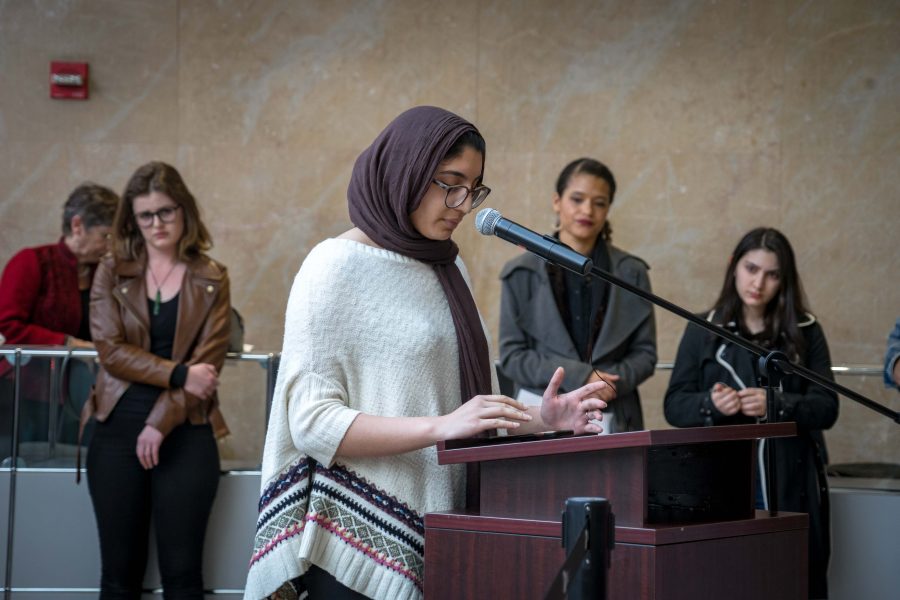Silver sophomore Mariam Abukwaik was overwhelmed by the headlines. At least 49 were presumed dead in Christchurch, New Zealand in a horrific massacre which targeted two mosques. Abukwaik attended Friday prayers that same day, and it was during this time that she found out her uncle, who was living in New Zealand, was missing. Soon after, she saw a text from her father telling her that he was among the dead.
“That definitely hit me and I couldn’t ignore it,” Abukwaik said.
On March 15, a gunman opened fire at two mosques in Christchurch, killing 50 people and injuring another 50. After the shooting, New Zealand Prime Minister Jacinda Ardern announced a ban on both assault rifles and the shooter’s manifesto. Ardern also refused to mention the shooter’s name, a move that garnered her international acclaim for her empathetic and decisive leadership.
Right before spring break, the Islamic Center at NYU hosted a vigil to mourn the victims of the shooting. At the vigil, Abukwaik shared how she had lost her uncle and recounted the experience as cathartic.
“It’s not easy putting myself out there in that way, but it was really therapeutic because the point of the vigil was to bring everyone together and let it be a healing space,” Abukwaik said.
After publicly speaking about the shooting, Abukwaik spent spring break in mourning. Abukwaik discussed the Muslim concept of ummah, the Arabic word for community, and how she felt her community was deeply impacted by the shooting.
“When one part of the ummah is hurting, the whole entire thing hurts,” Abukwaik said. “Everyone hurts. Knowing that my family, my people and my ummah was hurting, in one area it made me hurt. This whole entire break I was hurting. I’ve just felt this weight in my heart.”
In light of the Christchurch shooting, NYU President Andrew Hamilton issued a statement, and a letter was sent out to students with addresses in New Zealand, but no email was sent to the entire NYU community about the shooting.
“Even in a time when mass shootings have become depressingly common, this attack stands out for its awfulness: its lethality, its religious bigotry, its use of social media, its timing and location — as Muslims peacefully attended Friday prayers in mosques,” Hamilton wrote in his statement. “[I]t is a painful reminder that hatred knows no borders.”
President of the Muslim Students Association and CAS senior Omer Malik heard about the shootings the night the news broke, and followed coverage of the shootings as they were happening. He felt as if he needed to be at the vigil for NYU’s Muslim community, and recalled feeling supported at the Friday prayers as crowds of Muslims and allies attended to mourn the shooting.
“For me, I was at first a little worried going to prayers after everything that had happened,” Malik said. “I wasn’t sure if I wanted to go, but then it hit that I had to go because I couldn’t let it impact me. I felt like I needed to be there to make sure that everyone else was doing OK, so I could be there for them.”
Malik also said that the vigil hosted for the victims of the Christchurch shooting was not the first vigil he’s had to attend at NYU.
“Sadly, it’s not the first vigil I’ve been a part of,” Malik said. “I’ve seen a lot of vigils and rallies on the steps on Kimmel, so it wasn’t anything out of the norm for me. I was just like, ‘OK, we have to go there and people are going to speak, and we just have to make sure things run smoothly.”
During spring break, the Islamic Center at NYU hosted a community healing space, an event where people share their feelings in a safe space.
A little more than a week after the shooting, many Muslim students are still recovering and reflecting. Malik hopes to plan another community healing space event to give more students the opportunity to share their feelings.
Abukwaik hopes that professors acknowledge how the shootings continue to impact students when classes begin on Monday.
“I’m a little bit nervous that people and other students and faculty are all going to walk in and feel like everything is chill when it’s not,” Abukwaik said. “There’s still so much aftermath. People are still so impacted by this.”
A version of this article appeared in the Monday, March 25, 2019, print edition. Email Meghna Maharishi at [email protected].


























































































































































